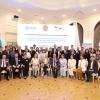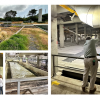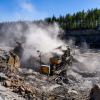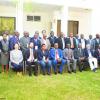News
Displaying Results 51 - 75 of 474
The most senior statisticians of countries across and beyond the UNECE region meet in Geneva this week for the 72nd annual Plenary Session of the Conference of European Statisticians. Kicking off their deliberations, a shared session with UN-GGIM Europe, the United Nations’ European geospatial body…
This week the Conference of European Statisticians (CES) meets in Geneva for its 72nd Plenary Session. On the agenda: an in-depth look at how countries can move towards a holistic way of measuring economic activity, sustainability and wellbeing.
A high-level seminar on 20 June will give CES…
Responding to the request of the Governing Council of the United Nations Special Programme for the Economies of Central Asia (SPECA), UNECE is building the capacity of public and private experts in the SPECA participating States to use the semantic standards and reference data models of the UN…
Representatives from countries across Central Asia and experts on the climate and clean air came together in Astana, Kazakhstan this week (11-13 June 2024) for the Sub-Regional Workshop on Integrated Planning for Climate and Air organized by the UNEP-convened Climate and Clean Air Coalition (CCAC)…
Central Asia is well placed to produce fresh and dried fruit and vegetables. Countries like Kyrgyzstan, Tajikistan, and Uzbekistan are important producers of dried fruit, in particular apricots. However, traders from the region have been facing challenges with diversifying their export portfolios…
Mediterranean countries come together to increase climate resilience of water and sanitation sectors
The Mediterranean region is warming 20% faster than the global average and for every 1-degree global temperature increase, it would warm up by at least 1.5-2 degrees. This is severely impacting water and sanitation and the health and well-being of the region’s population. According to the World…
In a ground-breaking decision in December 2023, Parties to the UNECE Convention on Long-range Transboundary Air Pollution (Air Convention) agreed to revise the Protocol to Abate Acidification, Eutrophication and Ground-Level Ozone, as amended in 2012 (Gothenburg Protocol), which is expected to…
In an important move to secure the supply of essential raw materials, the European Critical Raw Materials Act (CRMA) entered into force on 23 May 2024. This legislation is a cornerstone in enhancing the EU's capabilities in sourcing, processing, and recycling critical raw materials (CRMs), which…
In North Macedonia, assisting households to make investments in green technologies not only supports climate action, but also helps them save on energy costs and improves living standards.
To support this aim, UNECE, UNDP, and IOM organized a Capacity Building Workshop in Skopje on the…
Addressing ministers at the 2024 International Transport Forum Summit (ITF24) in Leipzig, UNECE Executive Secretary Tatiana Molcean recalled that 152 United Nations Member States are contracting parties to at least one of the 61 transport conventions hosted by UNECE. These legal instruments help to…
Extreme weather events exacerbated by climate change increasingly threaten the ability of countries worldwide, including those in the UNECE region, to sustain safe, reliable, and equitable transport and mobility.
Adapting to future impacts of climate change is therefore no longer a concern to be…
In the face of global crises, progressing towards Sustainable Development Goal (SDG) 16—promoting peaceful, inclusive societies, justice for all, and accountable institutions—is a cross-cutting enabler for the 2030 Agenda. SDG16 intertwines with the other SDGs, underscoring the importance of…
In her opening remarks at the 8th edition of the UNECE International PPP Forum, UNECE Executive Secretary Tatiana Molcean emphasized the urgency of accelerating the implementation of the SDGs and climate action through sustainable Public-Private Partnerships (PPPs) and infrastructure finance.…
With its strong mining industry, mountainous areas and high seismic hazards, prevention and preparedness for disasters and climate change adaptation are high on Tajikistan’s agenda. In particular, the increasing frequency and severity of weather events due to climate change can undermine the safety…
The technology associated with low-cost sensors (LCS) to monitor air quality has seen rapid developments over the past few years. While their use becomes more widespread and some are promoting them as silver bullet for air pollution science and control, experts have advised caution.
It is…
The transition to a circular economy is pivotal for achieving sustainability goals, especially within the clean tech sector. Platforms can play a crucial role in facilitating this transition by connecting stakeholders, streamlining resource flows, and enabling efficient material reuse through the…
The United Nations Code for Trade and Transport Locations, UN/LOCODE in short, a UNECE flagship product, is a geographic coding scheme that uniquely and unambiguously identifies locations worldwide for transport and economic activities. In its role as a fundamental cornerstone of the global trade…
The Fourth Cycle of UNECE Environmental Performance Reviews (EPR) is underway with the fourth review of Montenegro, carried out under the leadership of UNECE.
A large, multidisciplinary team of international experts worked in Podgorica from 22 to 30 April 2024, assessing the…
Ecosystems are highly sensitive to air pollution. To sharpen emissions reductions measures under the UNECE Convention on Long-Range Transboundary Air Pollution, expert groups have started scientific and technical work to support decision-making in the context of the process to revise the…
Addressing the Tashkent International Investment Forum (2-3 May 2024), UNECE Executive Secretary Tatiana Molcean called for the mobilization of private sector investments to support the implementation of the Sustainable Development Goals (SDGs) and to foster regional cooperation in Central Asia.…
As the climate warms, wildfires are becoming more frequent. Parts of Southern Europe, such as Spain and Greece, have already seen their first wildfires of the season, with devastating impacts on local ecosystems and biodiversity. Wildfires, however, also have major impacts on global and regional…
UNECE Resource Management Week 2024 spotlighted the growing roles of the United Nations Framework Classification for Resources (UNFC) and the United Nations Resource Management System (UNRMS) in promoting sustainable development through enhanced integration and effective management of natural…
As we move beyond the midpoint of the 2030 Agenda and with only 12% of the Sustainable Development Goals (SDGs) on track, an immediate, globally coordinated push to meet the 2030 deadline is urgently needed. Sustainable Public-Private Partnerships (PPPs) and infrastructure finance are central…
Iraq grapples with severe water challenges exacerbated by climate change, population growth, upstream dam construction, and decades of conflict and instability. The Euphrates and Tigris rivers, vital lifelines for the region’s agriculture, ecosystems, and communities, face increasing threats from…
The Water Convention has facilitated the First round of Technical & Planning Negotiations of the Draft ‘Agreement on the Establishment of the Luapula River and Lake Mweru Authority between the Democratic Republic of Congo (DRC) and Zambia on 18 and 19 April, concerning the transboundary…
























